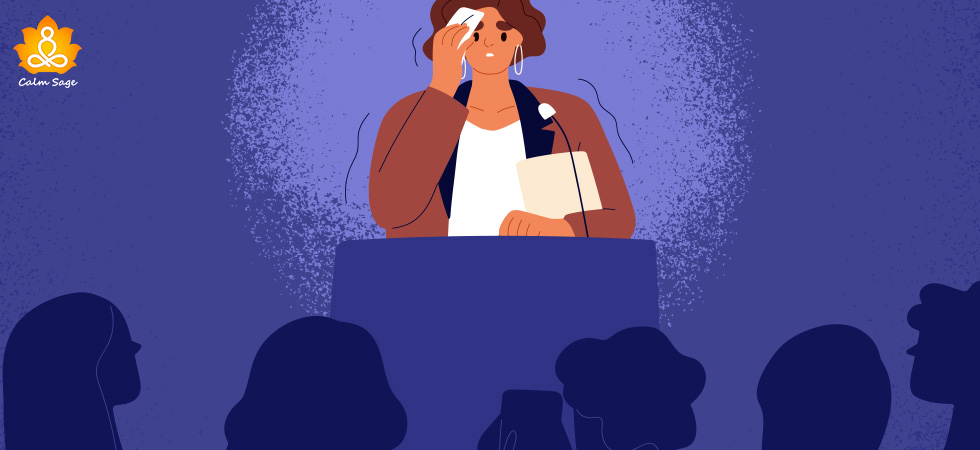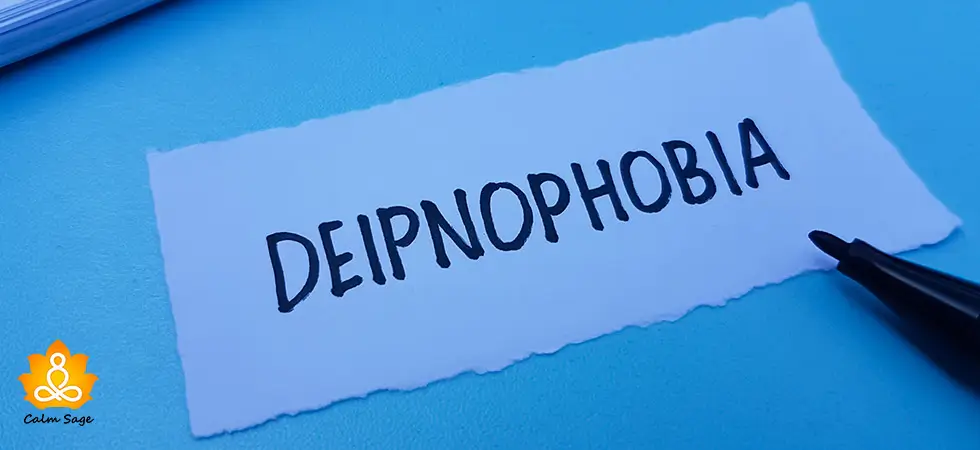Glossophobia Or The Fear Of Public Speaking: What Is It & How To Overcome This Phobia

When someone asks me to speak in public, my breath freezes in my chest, and my palms sweat. The mere thought of standing and speaking in public brings me anxiety. Not only me but many others struggle with the same situation.
Did you know there is an official term for the fear of public speaking?
Yes! Glossophobia! And you and I are not alone in struggling with the fear of public speaking. Almost 75% of people struggle with glossophobia or the fear of public speaking.
Speaking in public can trigger feelings of anxiety and distress in people with glossophobia. Not only that but it can cause you to experience trembling, sweating, and an increased heart rate. This phobia can also trigger your flight response, causing you to run from the distressing situation.
This social phobia can be strong and can worsen over time if not controlled sooner. This type of fear can also severely disrupt your daily routine and life – professional and personal.
In this article, I’ll be helping you explore what glossophobia is, the fear of public speaking, what are its symptoms, the potential causes of glossophobia, and how you can overcome this phobia.
What Does Glossophobia Mean?

A subset of social phobia, glossophobia (Glos-so-pho-bee-a) is a complicated condition where one fears public speaking. With other phobias, people experience panic and anxiety when confronted with a specific situation. However, people with glossophobia experience panic over being judged and/or embarrassed during or after their presentation.
Fear and anxiety stem from judgment and while this fear may not seem a serious one but it is. Glossophobia can also be categorized under social anxiety disorder.
What Does Glossophobia Look Like?

From the outside, glossophobia may not look like a serious condition or fear but people struggling with the fear of public speaking may find it difficult to cope in social situations.
Common physical signs or symptoms of glossophobia may be:
- Nausea
- Sweating
- Trembling
- Increased heart rate
- Shortness of breath
- Dizziness
- Muscle tension
- Urge to flee
Apart from the above symptoms, a person with glossophobia may also experience anxiety or panic attacks before, during, or after their speech or presentation.
Many a time, the fear of public speaking may be misdiagnosed as other disorders such as selective mutism, especially in children. It is recommended that you speak to a professional mental health counselor for an official diagnosis.
What Can Cause Glossophobia?
While there is no exact cause of glossophobia, it is safe to say that one may develop this fear due to a combination of genetic, environmental, and behavioral factors. Someone with a family history of glossophobia or other social phobias may have an increased risk of developing the fear of public speaking than others.
Social upbringing or situational factors such as being made fun of during a presentation, facing rejection, etc. can also contribute to one developing glossophobia.
Other causes can be a fear of social interaction, adjusting to a new job or a new school, etc. People with glossophobia may also struggle with:
- Low self-esteem
- Communication problems
- Pessimism
- Fear of criticism
- Poor social skills
- Poor relationships
- Poor performance at work and school
- Depressive episodes
Remember, glossophobia can affect almost every aspect of a person’s lifestyle.
Are There Treatment Available?

Yes! There are treatment options available to treat glossophobia. One of the most recommended treatments for glossophobia is cognitive-behavioral therapy (CBT). With CBT, you can learn to replace your negative feelings with positive ones. With this therapy, you can learn other coping and relaxation techniques to cope with a panic attack.
Many a time, antidepressants can also be prescribed to control depressive episodes and other symptoms of social anxiety.
Other Tips To Help Overcome Glossophobia
You can also try these strategies to overcome glossophobia:
- Be kind to yourself. The way you self-talk can also play a role in your moods and anxiety levels.
- Improve emotional wellness. Your emotions also play a big role in influencing your behavior. Practicing emotional wellness can help.
- Improving social skills. If you struggle with social interactions and public speaking, it is best if you work on improving your social skills.
- Join a support group. Listening to others’ experiences can help you learn how to manage yours.
- Ask for help. If your daily life is being affected by your fear of public speaking, it is best if you ask for help. Talking to a loved one or a professional counselor can help.
Final Thoughts…
Struggling with public speaking is normal but when your fear of public speaking begins to affect your daily routine – at work and home – then you must address your fear. Working through your fear can be challenging but with the right professional help, you can overcome your fear and live a happy, healthy life.
If you’d like to connect with a professional counselor, you can click here. You can also write to us at info@calmsage.com or DM us on social media for more! I hope this article helped you understand what glossophobia is, the fear of public speaking.
Was this article helpful? Let us know in the comments below! Your feedback and thoughts matter to us!
Take Care!




















